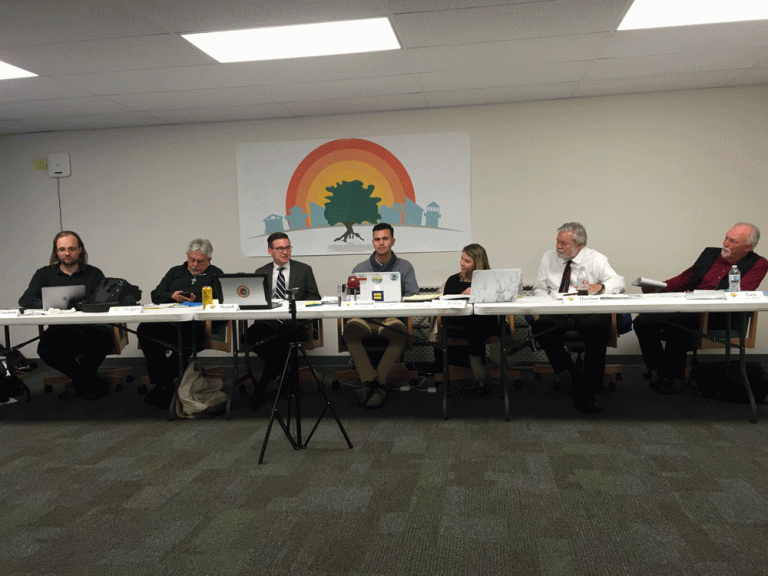
Shomik Mukherjee
Executive Managing Editor
Local politician Jay Freeman suggested Tuesday that George Thurlow set up a student internship program for the Isla Vista Community Services District in order to please donors to the University of California, Santa Barbara. Thurlow responded to the statement on Wednesday, calling Freeman’s accusation of his intent “ludicrous.”
Freeman gave his comments to The Bottom Line following just the second board meeting of the I.V. CSD’s history. Of the board’s seven directors, five are elected. Freeman, a local tech guru and UCSB alum, is one of them. The other two are appointed by UCSB Chancellor Henry Yang and the County of Santa Barbara, respectively.
Thurlow is Yang’s appointee, and also serves as the chancellor’s Special Assistant for Isla Vista Affairs, as well as the Assistant Vice Chancellor for Alumni Affairs at UCSB.
Freeman said he wanted the two appointed positions, Thurlow’s and Robert Geis’, to hold “downgraded” power compared to the other directors and become “non-voting” positions. He also accused Thurlow of being in a direct conflict-of-interest, after Thurlow had advocated for the planned CSD student internship program at Tuesday’s meeting.
According to Freeman, Thurlow works closely with donors and “convinced” one to provide money to create internships. The program would be an established agreement between the CSD and the university. Freeman alleged Thurlow wore “all three hats” while setting up the program, since Thurlow works for the university, serves as the chancellor’s Special Assistant for Isla Vista Affairs (which partly negotiates with local government agencies on behalf of the chancellor), and the CSD itself.
But Freeman said when he tried to ask Thurlow questions at the meeting, Thurlow resisted the notion he was a “representative” of the university’s interests — which Freeman called “ludicrous.”
Freeman also suggested Thurlow’s interests are linked to the UCSB Foundation, which organizes donations to the university. Specifically, he noted a 2014 report by the foundation’s Board of Trustees titled “A Call for Action.” The report specified actions the trustees wanted UCSB to take, which included establishing a heightened presence in I.V.
The internship program’s relation to the trustees’ report is no secret, as Freeman himself noted. The CSD extended a Memorandum of Understanding (an informal agreement without legal binding) to the university’s Department of Political Science at Tuesday’s meeting in order to establish the internship program. The sixth item on the MOU explicitly states that the internship program will meet the trustees’ recommendations in the report, which include creating “community centered programs, initiated by UCSB faculty, staff and students.”
But Freeman went a step further, saying Thurlow “carefully set up” the program to “check off a box” with the donors.
“The reason why [Thurlow is] wearing all three hats looking to pull this off is because it will make [his] offices and the university look really good with the trustees,” Freeman said.
Speaking to The Bottom Line Wednesday morning, Thurlow responded to Freeman’s statements. He said his fellow director was “nitpicking like crazy,” and asked what Freeman’s “problem” was with the program.
“I went out and got a donor to help I.V.,” he said, “and all he does is sit on the sidelines.” Thurlow emphasized he raised the money for I.V. in order to get the CSD “off the ground,” because it has “no staff, no resources.”
“Saying that somehow ‘I checked boxes,’” Thurlow said, “that’s not a reason to be against a program that’s going to provide resources to help build a community.” He added that Freeman’s reasons for being “so adamantly against” the program should be found out.
Thurlow affirmed he had begun working on the program after securing support from an interested donor. The donor had wanted the university to take its “academic mission into I.V.” But Thurlow called the suggestion he established the program to “please” the donor “ludicrous.”
“Most donors want an outcome from their donation,” he said. “To assume there are donors who will give you money and let you spend it any way you want in I.V., that’s what is ludicrous.” He said the program will give UCSB students real-life experience, calling the situation a “win-win-win” for everyone involved. Thurlow emphasized he does not understand why Freeman would speak out against the opportunity.
“And, frankly, if you talk to everyone else on the board, they don’t get it either,” he said, affirming he has the support of the other five directors for this program.
“I just wish Jay would spend half of his time trying to raise money for the I.V. CSD instead of undermining other people’s efforts to help the CSD,” he said. He went on to say it would be “too bad” if Freeman “is successful at sinking this program,” saying “it’s the students who lose.”
Program Details Debated at Meeting
Freeman and Thurlow had already clashed briefly during Tuesday’s meeting, where the directors discussed establishing the internship program in question. In the program, UCSB students would work for the CSD in exchange for academic credit and a wage of $12 per hour. Funding for the program, Thurlow said at the meeting, would come in an amount from a private donor, as well as $3,000 pledged by the Associated Students of UCSB.
The university’s Department of Political Science would select interns and provide the students with academic credit. To get the program started, the directors would need to send the MOU — an informal agreement — to the department. While the interns would be UC employees, Thurlow specified the CSD would determine the interns’ projects. The political science department will determine details of the hiring process and certain terms of the contract, including the expected number of hours per week.
“I will try to be incredibly careful not to influence, in any way, what the project status is,” Thurlow said at the meeting.
Before questioning Thurlow, Freeman took a moment to clarify his opinion of UCSB. “I actually love the university,” he said. “I’ve donated over $100,000 to the university.”
But the next half-hour of the meeting largely featured a back-and-forth between the two directors, as Freeman pressed Thurlow on his role as the “negotiator” between the CSD board and university. A main point of concern was the interns’ injury liability, to which Thurlow pointed out that, as UC employees, interns could hold the university liable in cases of injury on the job.
“This is the poli sci department and Alumni Affairs taking on all the risk here,” Thurlow said. All the same, Freeman emphasized that the CSD board should negotiate firmly with the department.
“If there’s things that we want, we should push on George a little bit,” he said, “and try to see if we can get George not to be 100 percent happy at the end of this, because none of us should be 100 percent happy at the end of this.”
“What is it that you want that you’re not getting?” Thurlow responded. “If you want to take care of the time cards,” he said, alluding to a task CSD interns would handle, “I’d be really thrilled.” He further disagreed he is “getting all the good stuff” from the deal.
“Personally,” Thurlow said, “there is nothing in [the agreement] that benefits me or Alumni Affairs. Nothing.”
Freeman then raised the stakes.
“I’m actually impressed at the way in which you manage to wear various hats and pull this off,” he said to Thurlow, a statement he would echo to The Bottom Line later at night. “That’s one of the cool things about working with you.”
“If this fails,” Thurlow said, “there aren’t a whole lot of people that are going to get blamed for this failing. And if it’s wildly successful, we’ll have everybody on this board sharing in the success.”
The board passed a motion to send the deal to the political science department. While five directors voted yes, both Freeman and Thurlow abstained.
Speaking to The Bottom Line directly after the meeting, Thurlow had initially praised Freeman, saying his fellow director had made some “excellent points.”
“I didn’t take it personally,” he said. “He was asking tough questions. It’s a good process.” As for his roles as both a university representative and a CSD director, Thurlow said he will work out how to align them “so there is never any conflict.”
Freeman also had good words to say for his fellow director.
“I like George,” he said. “I like the matter-of-factness that George has, even though occasionally I think he rushes some things.” Freeman did not apologize for his combativeness during the meeting, though he did say he would never let things get “nasty.” Thurlow responded to Freeman’s statement Wednesday.
“He always says that before and after he attacks me,” Thurlow said. “It’s an interesting dynamic. He continues to make these personal attacks, and then after he does them, he says that. That’s interesting behavior.”
The CSD will meet next on April 4 at 6:00 p.m. at 970 Embarcadero Del Mar.

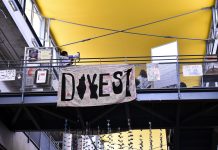

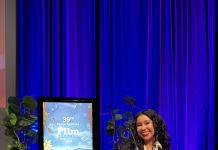
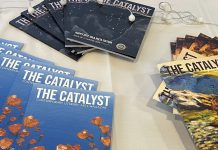


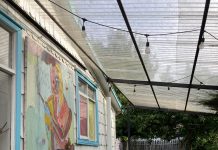
Dear TBL: Local government is not House of Cards.
Comments are closed.